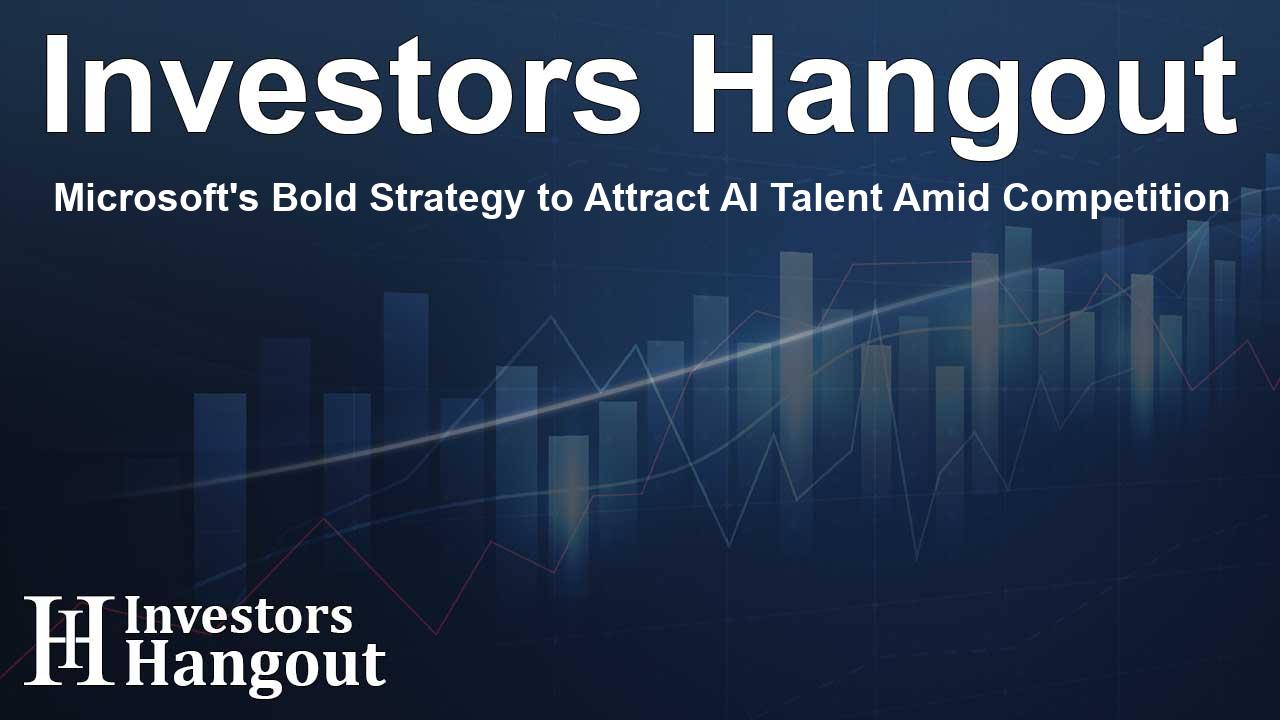Microsoft's Bold Strategy to Attract AI Talent Amid Competition

Microsoft's Initiatives to Secure Top AI Talent
Microsoft Corporation (NASDAQ: MSFT) is taking bold steps in the quest for dominance in the artificial intelligence sector. The company is reportedly enhancing its recruitment strategies to attract leading AI professionals, specifically targeting talents who currently work with Meta Platforms, Inc. (NASDAQ: META). In a competitive tech landscape where innovative minds are crucial, Microsoft is prepared to offer attractive financial packages to lure these professionals away from their existing roles.
Compensation Packages That Compete with Industry Leaders
Recent reports suggest that Microsoft has adopted a new hiring framework designed to challenge the lucrative pay structures at Meta. According to internal documents, the tech giant aims to match, if not exceed, the enticing offers that Meta has put on the table. This initiative includes substantial signing bonuses likely worth millions for selected candidates, making the transition from Meta to Microsoft an appealing choice for many within the AI community.
Leading AI Divisions at Microsoft
Key figures within Microsoft AI, such as former Google DeepMind co-founder, Mustafa Suleyman, and the CoreAI division under the leadership of ex-Meta engineering head, Jay Parikh, are spearheading this recruitment drive. Their direct involvement signifies the importance of this strategy as Microsoft seeks to refine its AI expertise and bolster its workforce with the best in the field.
Targeted Teams for Recruitment
Microsoft is not targeting random talents; a detailed list shared amongst hiring managers highlights specific teams within Meta such as Reality Labs, GenAI Infrastructure, and Meta AI Research. This shows a focused effort in attracting individuals who have demonstrated significant contributions in AI research and development. The company is clearly strategic about which teams it seeks to enhance its competitive edge.
The High Stakes of AI Talent Wars
The battle for talent in the AI industry is intensifying. Meta's reported compensation packages for AI talent have set an immense precedent, with offers potentially reaching a staggering $250 million. This pressure has implications not just for individual companies but for the industry as a whole, as tech giants vie for the same limited pool of exceptional talent.
Competing with Tech Giants
It’s noteworthy that this competition is not confined only to Microsoft and Meta. Companies like OpenAI have also been in the spotlight, with its CEO, Sam Altman, commenting on Meta's cutting-edge compensation strategies for engineers. The stakes are high, and this competitive environment pushes every major player to rethink their hiring and compensation strategies to secure top individuals before they are claimed by competitors.
Microsoft's Financial Performance and Strategic Shift
As this landscape unfolds, it's essential to consider Microsoft's recent financial trends. The company reported a remarkable fourth-quarter revenue of $76.44 billion, marking a 17% rise from the previous year. These numbers underscore the strength of Microsoft's overall market position as it reallocates resources, evidenced by a recent downsizing of about 9,000 employees while simultaneously bolstering its AI departments.
Impact of Record AI Investments
Microsoft is not alone in this AI investment spree. The combined spending on AI infrastructure across major players like Microsoft, Meta, and Alphabet Inc. (NASDAQ: GOOG) is anticipated to reach $240 billion by 2025. Analysts, like Dan Ives from Wedbush, describe this surge as a pivotal moment in technology, highlighting the implications of such expenditures for the future landscape of AI.
Conclusion: Navigating the Future of AI
As it stands, Microsoft is making strategic moves designed to position itself as a leader in the AI sector. By pursuing key engineering talent from competitors while balancing ambitious financial goals, the company is setting a new precedent for investment in talent acquisition in the tech industry. With other tech giants watching closely, the outcome of this talent war will be pivotal in determining which company emerges as the front-runner in AI innovation.
Frequently Asked Questions
What is Microsoft's strategy for acquiring AI talent?
Microsoft is offering competitive pay packages to attract top AI professionals from Meta, including multimillion-dollar signing bonuses.
How does Meta's compensation for AI talent compare?
Meta is reportedly offering packages reaching up to $250 million for certain AI researchers, setting a high bar in the talent acquisition race.
Who is leading the AI divisions at Microsoft?
Key leaders include Mustafa Suleyman, a former co-founder of Google DeepMind, and Jay Parikh, former engineering head at Meta.
What are the financial implications of Microsoft's AI initiatives?
Microsoft's recent financial performance shows a revenue increase of 17%, reflecting its strong market position while it reallocates resources to AI.
What does the future hold for AI investments?
The combined investment in AI by major tech giants is expected to reach $240 billion by 2025, marking a significant trend in technology investment.
About The Author
Contact Owen Jenkins privately here. Or send an email with ATTN: Owen Jenkins as the subject to contact@investorshangout.com.
About Investors Hangout
Investors Hangout is a leading online stock forum for financial discussion and learning, offering a wide range of free tools and resources. It draws in traders of all levels, who exchange market knowledge, investigate trading tactics, and keep an eye on industry developments in real time. Featuring financial articles, stock message boards, quotes, charts, company profiles, and live news updates. Through cooperative learning and a wealth of informational resources, it helps users from novices creating their first portfolios to experts honing their techniques. Join Investors Hangout today: https://investorshangout.com/
The content of this article is based on factual, publicly available information and does not represent legal, financial, or investment advice. Investors Hangout does not offer financial advice, and the author is not a licensed financial advisor. Consult a qualified advisor before making any financial or investment decisions based on this article. This article should not be considered advice to purchase, sell, or hold any securities or other investments. If any of the material provided here is inaccurate, please contact us for corrections.
